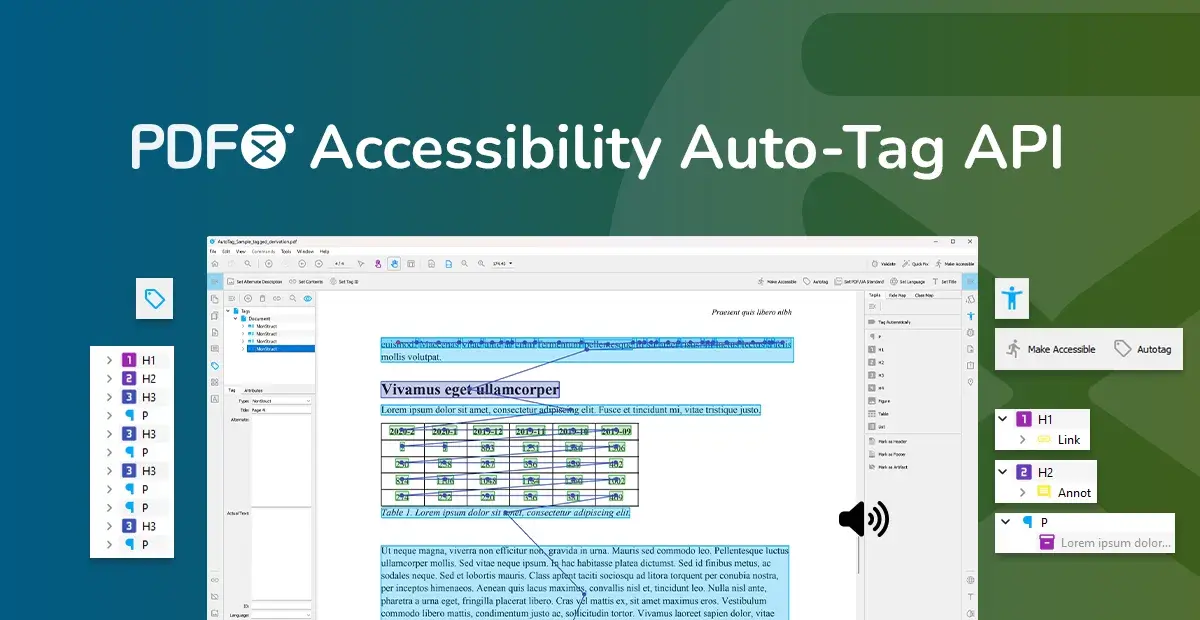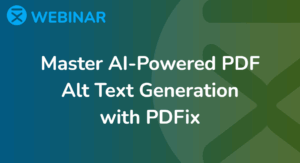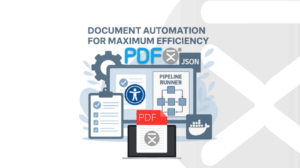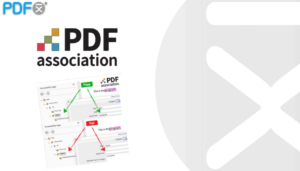PDFs are a cornerstone of our digital world, but around 90% of them are still partially inaccessible to people with disabilities. The fixed layout that makes PDFs so reliable can also make them a nightmare for accessibility, turning what should be a straightforward task into a complex and frustrating challenge.
PDFix SDK empowers developers to integrate PDF functionality directly into their applications, helping businesses simplify PDF management and enhance their operational efficiency. Our PDF SDK offers a comprehensive set of features designed to boost document accessibility and workflow productivity. Keep reading to explore its full range of benefits.
PDFix: Accessibility with Seamless Auto-Tagging
Tags are structural elements in a PDF that outline the document’s logic. For assistive technologies like screen readers to accurately interpret a document, PDF must include structure tags that define its layout and reading order. PDFix’s Auto-Tag API, powered by the advanced PDFix SDK, is a powerful tool that plays a key role in automatically tagging unstructured documents. Our advanced layout recognition tool identifies headings, paragraphs, lists, sections, and tables, and automatically tags these elements. It defines the entire logical structure of the document and overall reading experience. This is relevant for documents created both within your organization and outside of it.
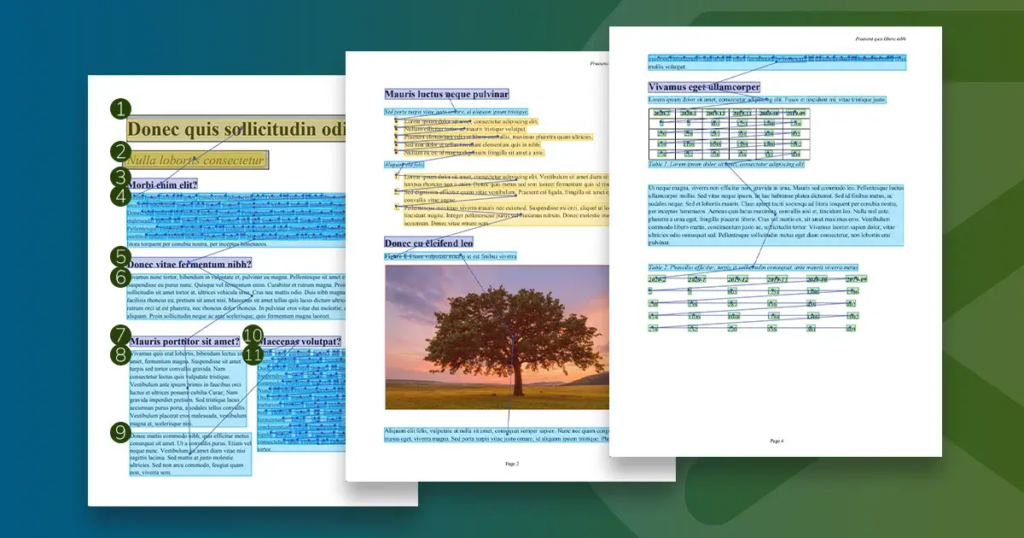
Unlock the Advantages of Tagged PDF Documents
Automated PDF Accessibility
Tagging PDFs can often be a slow, manual, and error-prone process, but automation significantly enhances efficiency. Once PDF auto-tagging is complete, our built-in validation tool takes over, assessing the document according to the machine-verifiable requirements of PDF/UA and WCAG. It provides a detailed accessibility report that identifies errors, fixes them automatically when possible, and offers guidance for issues requiring manual intervention.
We are continually advancing our AI capabilities to further automate each step in the accessibility process. Our next release will include features such as automated image alt text generation, language detection and much more. Stay tuned for these exciting updates!
Smooth Conversion to Responsive HTML
Did you know that well-tagged PDF documents simplify the conversion to responsive HTML? The quality of tagging significantly affects the accuracy and quality of the resulting HTML output. That’s why our advanced auto-tagging API, powered by the PDFix SDK, plays a crucial role in achieving effective results. It ensures that PDF content is semantically reusable and adaptable. Well-tagged PDFs can reflow seamlessly, allowing their content to fit perfectly across various screens and mobile devices. Discover how our tools can enhance your document conversion process and deliver superior results.
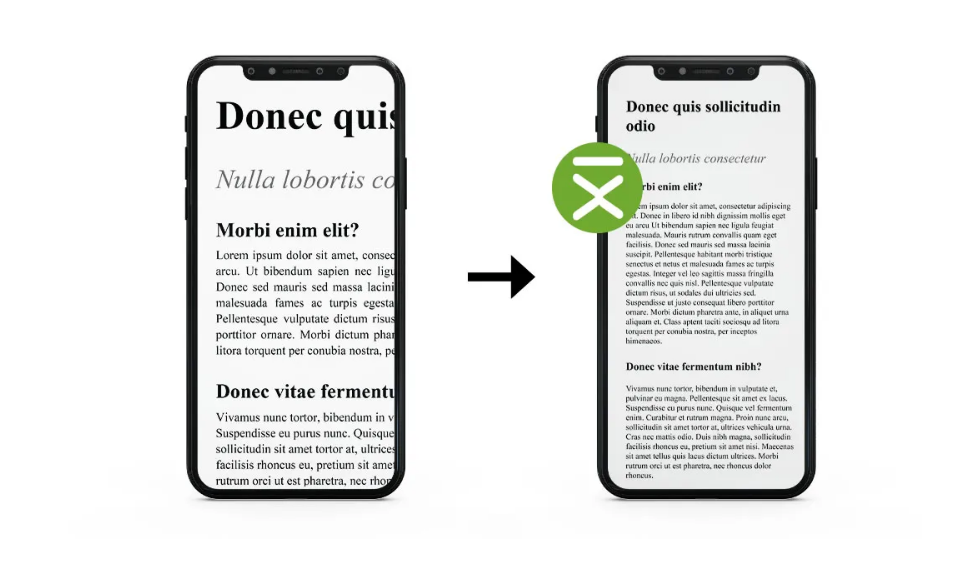
Accurate Data Extraction
Our auto-tagging tool simplifies the creation of a well-structured PDF, which is essential for accurate data extraction. By applying precise auto-tagging, your PDF gains a logical structure that significantly enhances data extraction efficiency. This structured approach ensures that information can be retrieved with greater accuracy. Moreover, well-tagged PDFs improve accessibility, making it easier for users to navigate and interact with the content.
Better Accessibility for All
At PDFix, we believe that making digital documents accessible begins with one key element: structure. We’re continuously developing tools that not only understand PDF content but also provide it with a logical structure. A well-tagged PDF ensures that content is organized logically, making it easier for everyone to navigate, including those with disabilities. When your PDFs are properly tagged, they become readable across various devices and tools. By prioritizing inclusivity, you enhance the user experience for individuals with disabilities and ensure that your content is accessible to all.
Up to 98% Automation in Accessibility with PDFix SDK
Most of our customers are IT Solutions and Software Services providers who have gained substantial benefits from integrating the PDFix SDK into their applications. Those who have adopted our SDK into their workflows have found they can automate between 70% and 98% of document processing, significantly reducing the effort needed to ensure each document is fully accessible. Although achieving complete accuracy still requires human oversight, we are continuously advancing our machine learning techniques. Each new product release brings us closer to achieving 100% automation and precision.
PDFix SDK for Use Across Industries
Government
Government agencies are increasingly adopting PDF SDK tools to enhance and automate their document management processes. This technology can convert legislative bills and public reports into formats compatible with screen readers, manage metadata for public records, and ensure content displays correctly across various devices. It also simplifies document distribution across different platforms and supports accessibility audits to ensure compliance with legal standards. By leveraging these capabilities, agencies can improve accessibility, maintain better organization, and ensure that all public information is available to everyone.
Education
PDFix SDK is a game-changer in education, ensuring that every student, including those with disabilities, can fully engage with course materials. This technology not only enriches the learning experience but also helps institutions comply with legal accessibility standards. For instance, it can transform course syllabi and research papers into formats that work seamlessly with screen readers. Our latest innovation, the University Remediation App, takes this a step further by offering a web application paired with a back-end processing server that automatically converts PDFs into accessible documents. Dive into our blog to explore how this cutting-edge solution is making a real difference in the education sector.
Financial Services
In the financial services sector, PDF SDK tool plays a crucial role in automating document management tasks. It efficiently converts complex documents, such as investment reports and compliance forms, into accessible formats. The software also streamlines data extraction from financial statements, simplifies the distribution of accessible documents like insurance policies, and handles interactive forms such as tax filings. Additionally, it adjusts document layouts for seamless viewing across different devices while ensuring compliance with accessibility standards. This automation not only helps financial institutions meet legal requirements but also improves transparency and enhances the overall user experience.
Healthcare Industry
In the healthcare industry, PDF SDK software is essential for making important health information accessible to patients, providers, and staff. This technology simplifies the conversion of patient records, prescriptions, and medical research reports into formats compatible with screen readers, ensuring that essential documents are easily accessible. It also manages metadata for electronic health records, streamlines form filling for patient data, and ensures documents are properly formatted for various devices. Additionally, the software supports smooth content distribution within and outside the organization and helps with accessibility audits to meet regulatory requirements. By incorporating these features, healthcare providers can enhance document accessibility, improve efficiency, and maintain secure, compliant medical records.
Digital Publishing
Digital publishing gains a lot from using PDF SDK to automate various tasks. This tool makes it easier to ensure legal compliance and expand audience reach by converting digital publications into formats that work well with screen readers, managing metadata for better searchability, and formatting content to fit different devices. By automating these processes, the PDFix SDK simplifies workflows, enhances efficiency, and maintains consistency in publishing. This results in more accessible documents, helps publishers meet legal standards, and shows a commitment to inclusivity and ethical responsibility.
Custom PDF Accessibility Solutions with PDFix SDK
If you have questions about our Auto-Tag API or need to add document accessibility to your project, feel free to get in touch. We’re well-known for crafting customized solutions with our advanced PDFix SDK. Let us know what you need, and we’d be happy to set up a call to discuss your project.
